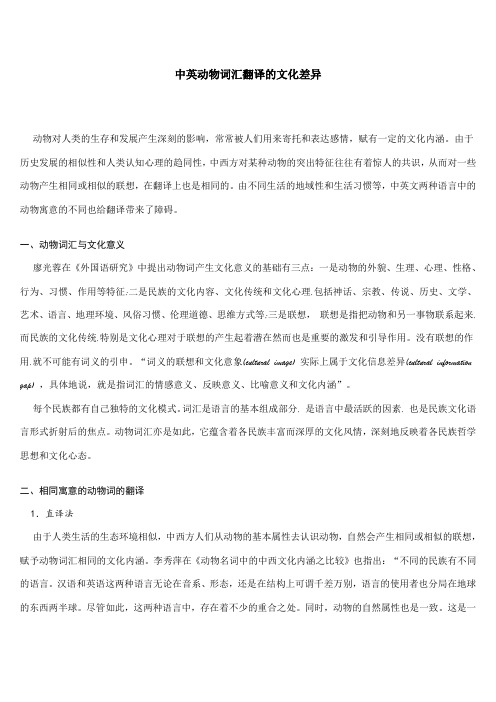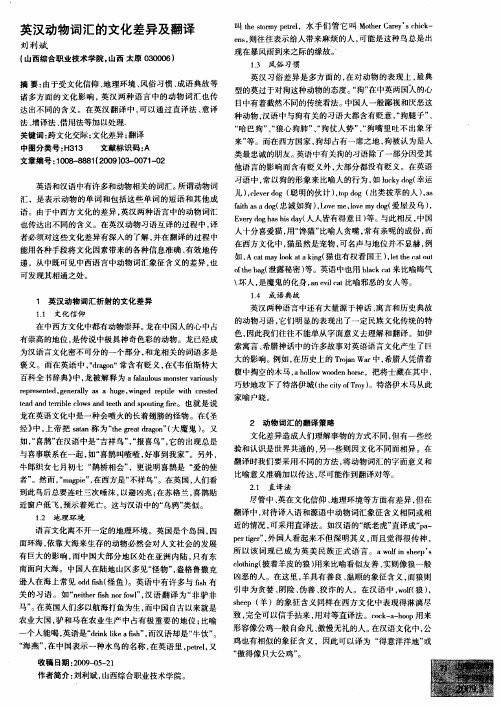论中英文中动物词汇的文化差异
中西方对动物文化差异

9.马(horse)
中:徐悲鸿擅长以 马喻人、托物抒 怀,以此来表达 自己的爱国热情。 徐悲鸿笔下的马 是"一洗万古凡马 空",独有一种精 神抖擞、豪气勃 发的意态。
• • • • • • • • • •
西:马的文化内涵很丰富。如: A person eats like a horse 说一个人能吃得很 I could eat a horse一个人饿极了 as strong as a horse 一个人强壮 to work like a horse像牛马一样辛苦地干活 to look a gift horse in the mouth对别人送来礼物的质量 不信任、百般挑剔 to back the wrong horse在选举或是比赛中支持错了人 to ride the high horse一个人摆架子,神气活现、自命不 凡 to act pretentiously自命不凡地 to get something straight from the horse’s mouth指 的就是to get something (news, information, etc.) from a reliable source, 得到的消息、信息可靠,可信
2.猫(cat)
• 中:一般是代表着正义的 (righteous) [‘raitʃəs] 高大形象。如黑猫警长中 刚正勇敢(brave)的黑猫 警长和蓝猫淘气中机智 (clever)热情乐于助人 (warm-hearted)的蓝猫。 猫在中国和西方国家都被 视为可爱的动物。中国人 认为“不管白猫黑猫,能 抓到老鼠的就是好猫”。
7.孔雀 (peacock )
• 中:孔雀是吉祥的象征,因为人们普遍认为,孔 雀开屏是吉利的事,若能有机会看到孔雀开屏, 便是幸运的。 • 西:在英国文化中并不是吉祥的动物,相反,、 它带有贬义,指洋洋得意、炫耀自己的人。强调 peacock与人媲美的高傲的一面。 • as proud as a peacock (孔雀般骄傲) • play the peacock (炫耀自己) • a peacock in (his) pride (开屏孔雀; 炫耀一时 的人) • gaudy as a peacock 象孔雀一样华丽; (穿得) 过于艳丽; (装饰得)过分花哨
英汉谚语里动物词汇的文化内涵对比分析

目录
01 英汉谚语中动物词汇 的文化内涵对比分析
03 二、方法
02 一、引言 04 三、结果
05 四、讨论
07 参考内容
目录
06 五、结论
英汉谚语中动物词汇的文化内涵 对比分析
谚语是各个民族文化的重要组成部分,其中动物词汇在英汉谚语中扮演着不 可或缺的角色。通过对英汉谚语中动物词汇的文化内涵进行对比分析,我们可以 深入了解英汉文化的异同点以及动物词汇在两种文化中的不同含义。
有些动物词汇在英汉两种语言中的文化内涵存在误解。例如,“狗”在英语 中常常被用来形容忠诚的朋友,而在汉语中,“狗”有时候被用来形容卑劣的人 或行为,这可能是由于历史和文化差异造成的误解。
三、研究方法
研究英汉动物词汇的文化内涵,可以采用以下几种方法:
1、语料分析法:收集英语和汉语中与动物相关的词汇和表达,分析它们的 文化内涵和象征意义。形象和寓意为人们所喜爱。这些谚语不 仅反映了人们对动物的认知和情感,还蕴含着丰富的文化内涵。在英汉两种语言 中,动物谚语的存在和含义并不是完全一致的,因此,对英汉动物谚语文化内涵 进行对比研究是非常有意义的。
首先,英语中的动物谚语大多源自西方文化传统,其中涉及的动物种类和象 征意义与中国有很大的不同。例如,“when the cat is away, the mice will play”(猫儿不在,老鼠成精)这条谚语中,猫被用来象征权威或纪律,而老鼠 则代表了顽皮或懒散。在西方文化中,猫和老鼠的关系通常被用来形容社会中不 同阶层或群体之间的关系。
参考内容二
随着全球化和文化多元化的发展,英语和中文在日常生活和文化传承方面的 差异日益突出。本次演示将英汉动物词汇的文化内涵进行跨文化对比分析,旨在 探讨两种语言中动物词汇的文化内涵异同,从而更好地理解和尊重不同民族的文 化。
自-英汉动物词汇文化内涵差异的原因

英汉动物词汇文化内涵差异的原因英汉两种语言是发达的语言,词汇极为丰富,其中与动物有关的词汇极多。
动物词汇指表示动物的单词和包括这些单词的短语和其他成语。
这些词汇不仅能形象地表现某种品质﹑性格,还可以简洁地描述某些事件及传达某种情绪。
在日常生活中,动物词汇由于具有丰富的表现力,经常被人们用来抒发自己的情感,丰富自己的语言,已被融入到各民族的语言中,为人们接受并广泛使用。
由于各民族的文化差异,动物被赋予的各种寓意都具有浓厚的民族文化特色及深远的社会历史渊源,英汉语中动物词汇的文化内涵就存在很大差异,体现了其所属群体的文化背景。
英汉两种语言中,通常会出现这样的情况,即一种动物的概念意义(referentialmeaning)完全相同,而其文化内涵却有明显差异、相互矛盾甚至相反。
由于英汉两个民族长期生活在不同的文化背景中,自然而然地对同一动物词产生不同的联想,赋予动物词以更丰富的文化内涵。
本文从历史文化、地域文化、习俗文化以及审美价值取向和社会心理方面分析英汉同一动物词汇的文化内涵不对等现象。
ﻫ(一)因历史文化不同而产生的文化内涵差异龙在我国历史上是一个图腾形象。
在我国传说中,龙是一种能够兴云降雨的神异动物,它集蛇、鸟、马、鹿、鱼、鹰等八种动物于一身,因而它具有这八种动物的本领,能上天,能入地,能在路上走,能在水里游,能在空中飞。
中国人都以龙为吉祥如意的象征,并以“龙的传人”而自豪。
在我国几千年的历史中,龙有至高无上的地位,一直作为封建专制权力的象征。
龙的勇猛和不屈精神也是中华民族所推崇的。
正是对“龙”精神的不断发扬光大,形成了中华民族不屈不挠的抗争精神和崇尚正直的道德观念,从而构成民族特有的文化精神和道德规范。
因此,在汉语中有关龙的成语就特别多。
例如:龙腾虎跃、生龙活虎、龙凤呈祥、望子成龙等许多褒扬之词。
但在西方神话传说中,dragon(龙)是一种巨大的蜥蜴,长着翅膀,身上有鳞,拖着一条长长的蛇尾,能够从嘴中喷火,是邪恶的象征。
中英动物词汇翻译的文化差异

中英动物词汇翻译的文化差异动物对人类的生存和发展产生深刻的影响,常常被人们用来寄托和表达感情,赋有一定的文化内涵。
由于历史发展的相似性和人类认知心理的趋同性,中西方对某种动物的突出特征往往有着惊人的共识,从而对一些动物产生相同或相似的联想,在翻译上也是相同的。
由不同生活的地域性和生活习惯等,中英文两种语言中的动物寓意的不同也给翻译带来了障碍。
一、动物词汇与文化意义廖光蓉在《外国语研究》中提出动物词产生文化意义的基础有三点:一是动物的外貌、生理、心理、性格、行为、习惯、作用等特征;二是民族的文化内容、文化传统和文化心理,包括神话、宗教、传说、历史、文学、艺术、语言、地理环境、风俗习惯、伦理道德、思维方式等;三是联想,联想是指把动物和另一事物联系起来,而民族的文化传统,特别是文化心理对于联想的产生起着潜在然而也是重要的激发和引导作用。
没有联想的作用,就不可能有词义的引申。
“词义的联想和文化意象(cultural image) 实际上属于文化信息差异(cultural information gap) ,具体地说,就是指词汇的情感意义、反映意义、比喻意义和文化内涵”。
每个民族都有自己独特的文化模式。
词汇是语言的基本组成部分, 是语言中最活跃的因素, 也是民族文化语言形式折射后的焦点。
动物词汇亦是如此,它蕴含着各民族丰富而深厚的文化风情,深刻地反映着各民族哲学思想和文化心态。
二、相同寓意的动物词的翻译1.直译法由于人类生活的生态环境相似,中西方人们从动物的基本属性去认识动物,自然会产生相同或相似的联想,赋予动物词汇相同的文化内涵。
李秀萍在《动物名词中的中西文化内涵之比较》也指出:“不同的民族有不同的语言。
汉语和英语这两种语言无论在音系、形态,还是在结构上可谓千差万别,语言的使用者也分局在地球的东西两半球。
尽管如此,这两种语言中,存在着不少的重合之处。
同时,动物的自然属性也是一致。
这是一种文化重合(cultural overlaps)现象。
英汉动物词汇的文化差异及翻译

儿 )c vr o 聪明的伙计 )t o 出类拔萃的人 )a ,l e dg( e , pdg( o , s
fi d g忠诚如狗 )L v e1 e ydg爱 屋及乌 ) aha a o( t s ,oem . v m o( o , E c o a idy 人人皆有得意 日) 与此相 反, vrd g s s a( y h h 等。 中国 人十分喜爱猫 , 馋猫” 用“ 比喻人贪嘴 , 常有亲呢的成份 , 而 在西方文化中 , 猫虽然是宠物 , 可名声与地位并不显赫 , 例
文章 编 号 :o 8 8 8 ( 0 9 0 - 0 1 0 1 0 — 8 12 0 )3 0 7 — 2
他语言的影响而含有贬义外 , 大部分都没有贬义。在英语
习语 中, 常以狗的形象来比喻人的行为 , lcy o( 如 uk dg 幸运
英语和汉语 中有许多和动物相关的词汇 。 所谓动物词 汇 ,是表示 动物的单词和包 括这些单词的短语和其他成 语。由于中西方文化的差异 , 英汉 两种语言 中的动物词汇 也传达出不同的含义 。在英汉动物习语互译 的过程中 , 译
英 汉动 物 词汇 的文化 差 异及 翻 译
刘利 斌
( 山西综合职业技术学院。 山西 太原 0 0 0 3 0 6)
口 e tr ee,水手 们管它 口 o e a yscik qt o pt l h s my r qM t r r ’ hc— h C e
en s ,
则往往表示给人带来麻烦 的人 , 可能是这种 鸟总是 出
大的影响。例如, 在历史上的 T ̄ nwa 中, r a r 希腊人凭借着
腹中掏空的木马 , H ww oe os,把将士藏在其中, a o o odnhr h e 巧妙地攻下了特洛伊城(h i o te toT y o特洛伊木马从此 cy f r
中英动物词对比翻译

英汉动物词汇文化对比于翻译一、动物词文化语义不同的原因:1.传统习俗东西方传统的巨大差异导致中英文里动物词汇文化意义的差别。
在中国人眼里,喜鹊是吉祥鸟,它的出现预示贵客来监。
但在英语国家里却是唠叨的象征。
中文里的蝙蝠从古到今都象征福气,而英语文化中却与福无关,甚至有邪恶与憎恶之意,像“as crazy as a bat”(疯得像蝙蝠)与“have bats in thebelfry”(异想天开)。
中国传统文化中的鹤象征长寿,所以有“鹤发童颜”与“鹤寿松龄”等。
英文中长寿的象征却是大象。
中文里凤代表吉祥幸福,也代表用来比喻少见的人才与罕见之物,如“凤毛麟角”。
英语中的凤凰则是复活与永生的代表,如“I believe that a phoenix that rises from its ashes will be even more dazzlingly beautiful.”(我始终相信浴火重生的凤凰将会更夺目。
)英汉两个民族在漫长的社会发展中形成了各自不同的文化传统,源远流长。
英汉文化中的神话传说、历史传统以及宗教信仰等在很大程度上造成了动物词文化意象的不同。
例如,凤凰( phoenix) ,依照Br ewer’s Dictionary of Phrase and Fable的说法, 凤凰是传说中的长生鸟,在阿拉伯沙漠上生存了五六百年,临死前衔草木筑巢,在唱完一首挽歌后用翅膀扇火自焚,然后从灰烬中又诞生出一只新凤凰。
于是,西方文化便取凤凰不死的神性,在英语中赋予其“复活”、“再生”的文化意象。
在汉语传统文化中,因凤凰的神异与美丽人们将其视为吉祥如意的象征,人们赋予了它“吉祥、珍贵、美丽”的文化意象,如“龙凤呈祥”喻指婚姻的完美,“凤毛麟角”表示非常珍贵的东西,以“凤姿”来象征女性的优美等。
在一种文化中提到某些动物时往往可以联想到某特征, 而在另一种文化中却联想不到任何特征。
这种例子, 举不胜举。
英汉动物词汇的文化内涵差异
英汉动物词汇的文化内涵差异英汉语中都有大量的动物词汇,文化内涵,有褒义有贬义。
通过对各类动物在英汉语言中字面意义相同,文化内涵相似或相同、不同、空缺以及字面意义不同,文化内涵相似或相同等方面的对比研究,可以发现文化对词汇的影响,揭示中英文化差异,有助于语言学习。
本文以蝙蝠、猫头鹰、牛、熊四词为例,对它们在英汉翻译中字面意义相同、文化内涵差异现象进行对比分析。
一、bat(蝙蝠)汉语中蝙蝠的“蝠”与“福”同音,常出现在年画上。
画五只蝙蝠飞入大门,即五福临门,表示长寿、富贵、康宁、好德和善终;画蝙蝠和鹿一起,代表福禄;画蝙蝠爬在一个圆圆的铜钱上,即福在眼前;红蝙蝠是大吉兆,因为洪福或鸿福。
传说千年的蝙蝠是白色的,吃了它还能长寿。
西方的bat却是一种与魔鬼和黑暗势力有联系的不祥之物,常让人联想到丑陋、凶恶、瞎眼、吸血动物等特征。
这也许是因为吸血蝙蝠的缘故。
凡英文中带有bat 的习语都含有贬义,如as blind as a bat视力差、有眼无珠,as crazy as a bat发疯,have bats in the belfry异想天开,come to bat面临严峻考验等。
许多人还认为bat与巫婆有关,他们相信bat 闯入私宅是死亡的凶兆。
二、owl(猫头鹰)猫头鹰也称夜猫子,专门夜间活动,叫声凄厉,在中国常被看作不祥之兆,如“夜猫子进屋,全家都哭”“夜猫子进宅,好事不来”。
有人甚至迷信地认为看到猫头鹰或听到它的叫声都要倒霉。
而西方人却把owl看作智慧的象征。
在希腊神话里,雅典守护神雅典娜是智慧女神,猫头鹰即是她的化身。
在儿童读物和漫画中,猫头鹰的形象是睿智、公正。
动物间的争端要请猫头鹰来裁决,紧要关头要向猫头鹰请教。
因此,英语中有as wise as an owl (象猫头鹰一样聪明)的习语。
而owlish形容一个人聪明、严肃。
由于猫头鹰夜间活动,owl可喻指常熬夜的人,这点与汉语中的夜猫子相吻合。
英汉动物词汇文化内涵差异的原因
英汉动物词汇文化内涵差异的原因
1.地理环境差异:由于英语和汉语所使用的地理环境不同,不同的地理环境对人们的生活方式、动物种类和对动物的认知等方面存在差异。
例如,英语是以英国为母语的语言,而中国则位于亚洲,两个地区的自然环境和动植物种类不同,因此对一些动物的认知和习惯词汇就会有所差异。
2.文化传统和习俗差异:不同的文化传统和习俗对动物的重视程度和称呼方式也存在差异。
以英语为例,由于历史、宗教和文化的原因,英语中对狗、牛、马等动物的词汇相对较多,而对猪、鸡等被视为普通食物的动物的词汇较少。
相比之下,中国的传统文化中,猪、鸡等动物在饮食和农耕领域有着重要的地位,因此对这些动物的认知和相关词汇较为丰富。
3. 宗教和意象差异:不同的宗教信仰和文化意象也会影响对动物的称呼和赋予的文化内涵。
例如,英语中的“lion”(狮子)在宗教和文化意象中常被认为是勇敢和权威的象征,而在汉语中,“狮子”在文化中更多的被用来指代狮子舞和娱乐表演中的形象,其象征意义相对较少。
总的来说,英汉动物词汇文化内涵差异的原因是多方面的,包括地理环境、文化传统和习俗、宗教和意象等因素。
这种差异反映了不同文化对动物的观念、重视程度和用途的差异,也反映了人们在不同文化背景下对动物内涵的不同理解和评价。
英汉动物词汇文化内涵的异同
英汉动物词汇文化内涵的异同
一、英汉动物词汇的异同点:
1. 动物象征意义的不同:英汉文化环境和历史传统不同,动物在两
种语言中的象征意义也有所不同。
比如,在英语中,狮子(lion)象征着
勇猛和威严;而在中国文化中,狮子则有瑞兽之称,是吉祥和庄严的象征。
2. 动物命名的差异:英汉动物词汇的命名会因为自然环境、民族文
化等因素而有所差异。
比如,在汉语中,虎叫“大虫子”,龙叫“水兽”,而在英语中,它们的命名则直接使用了“tiger”和“dragon”这两个词。
3. 动物文化带的不同:动物的文化寓意在英汉两种语言中也不相同。
比如,象征忠诚的动物,在中英文化中有差异。
在中国文化中,狗被视为
忠诚的象征;但在英文中,dog却有贬义的含义。
二、英汉动物词汇的共同点:
1.动物词汇的继承:英汉两种语言都继承了古代文化对动物象征意义
的理解。
例如,虎在两种语言中都被视为力量和威严的象征。
2.动物词汇的多样性:无论是英文还是汉语,动物词汇都非常丰富多样。
除了常见的动物词汇外,还存在大量比喻性的动物词汇,用来形容人
的特征和行为。
总结起来,英汉动物词汇的文化内涵有一些异同。
这些差异和共同点
反映了英语和汉语在历史、文化和环境等方面的差异。
了解这些异同可以
帮助我们更好地理解和使用动物词汇,并进一步了解英汉两种语言的文化
差异与共通之处。
英汉动物词汇的文化内涵差异
英汉动物词汇的文化内涵差异
1.神话传说:英汉文化中的神话传说会影响对一些动物的理解和看法。
比如,在英国文化中,独角兽被认为是一种神奇的生物,象征着纯洁和力量;而在中国文化中,龙被视为神话中的吉祥之兽,代表着皇权和幸福。
这些神话传说会影响人们对这些动物的态度和情感。
3.文学作品与艺术形象:在英汉文学作品和艺术形象中,不同动物与
特定的文化形象紧密相连。
比如,在英国的经典小说《白鲸记》中,白鲸
被描绘成一种神秘而有力的生物;而在中国文学作品《西游记》中,猴子
孙悟空被塑造成了机智勇敢的形象。
这些刻画进一步塑造了人们对这些动
物的印象和认知。
总之,英汉动物词汇的文化内涵差异体现在对动物的神话传说、象征
意义以及文学作品和艺术形象的不同解读上。
这种差异反映了各自文化中
对动物的不同观念、信仰和价值体系,也反映了不同文化对动物与人类关
系的理解和表达方式的差异。
- 1、下载文档前请自行甄别文档内容的完整性,平台不提供额外的编辑、内容补充、找答案等附加服务。
- 2、"仅部分预览"的文档,不可在线预览部分如存在完整性等问题,可反馈申请退款(可完整预览的文档不适用该条件!)。
- 3、如文档侵犯您的权益,请联系客服反馈,我们会尽快为您处理(人工客服工作时间:9:00-18:30)。
英语词汇学期末论文论中英文中动物词汇的文化差异The Cultural Differences of Animal Words in English and ChineseABSTRACTLanguage is the crystallization of human cultural development contains a nation's social consciousness, history, culture, customs and other social characteristics. Different cultural backgrounds and cultural traditions, making the different way of thinking, values, codes of conduct, and lifestyle between Chinese and English. There is much more obvious in animal words. Due to the differences in culture, the two languages, English and Chinese, the cultural connotation and significance given the same kind of animal is generally different. From a linguistic point of view, by contrast of Animal Words in English and Chinese to reveal the cultural differences.KEY WORDS: cultural differences, language中文摘要语言是人类文化发展的结晶,蕴含着一个民族的社会意识、历史文化、风俗习惯等各方面的社会特征。
不同的文化背景和文化传统,使中西方的思维方式、价值观念、行为准则和生活方式等方面也存有一定的文化差异,在中西方的动物词汇中体现得尤为明显。
由于中西方文化的差异,英汉两种语言赋予同一种动物的文化内涵和意义一般是不同的。
本文从语言学的角度,对比英汉语言中的动物词汇,以揭示文化差异。
关键词:文化差异、语言ContentsI Introduction (5)II The Cultural Meaning of Animal Words in Chinese and English (5)2.1 The Same Animal Words with Commendatory Meaning in Chinesebut Derogatory in English (6)2.2 The Same Animal Words with Meaning in Chinese butCommendatory Meaning in English (6)III Reasons for These Differences (6)3.1 Religious Influences (7)3.2 Fables (7)3.3 Customs and Living Habits (8)IV Conclusion (8)I IntroductionAnimals play a very important role in the lives of human beings. Every kind of animal has their own characteristics, which endow them with many cultural meanings. Language is an essential element of one concrete culture of a people, and it influences culture deeply. Animal words ,as an essential aspect of language also influence culture. At the same time , culture also influences language and animal words. Along with the development of human society , animals in different peoples own different cultural meanings by different prospect of views according to their characteristics, their stories, and their relation with human beings, etc. This phenomenon can be found in Chinese and English easily. China, which has a long history of 5000 years, possesses rich culture which influences Chinese language and the animal words. In Chinese , many animal words have their own cultural meanings and these meanings are used frequently in the lives of Chinese people. What will reflect in people’s mind as soon as mentioning one concrete animal is not only the image of that animal, but also its cultural meaning. English, which is most widely spoken in the world, is also influenced by the culture of English-speaking countries. So animal words also load asrich cultural meanings in English as that in Chinese. Because of these differences in Chinese and English culture, the cultural meanings in Chinese and English of animal words are different.II The Cultural Meaning of Animal Words in Chinese and English There are many animal words as well as animals in the world. However , animal words in different culture may not necessarily have the same meanings. In fact, they might be quite different in Chinese and English.Some of the animal words have totally different cultural meanings in Chinese and English. There are some animal words have commendatory meanings in Chinese but derogatory meanings in English. While some other animal words have derogatory meaning in Chinese but commendatory meanings in English.2.1 The Same Animal Words with Commendatory Meaning in Chinese but Derogatory in EnglishIt is quite common to find that many animal words have completely opposite meanings in Chinese and English. Some of the animals are appreciated by the Chinese people, so those animal words own commendatory meanings in Chinese .Every Chinese is quite familiar with dragon, which has rich cultural meanings in Chinese .It is the symbolization of Chinese nation. To Chinese ,a dragon is something scared and has been referred to as the ancestor of the Chinese nation-that’s why the Chinese all call themselves descendents of the dragon. In ancient time, people thought dragon is a mythical with great power. It symbolized the king in feudal society. So the kings were called “sons of dragon”.Dragon is scared to every Chinese . However, in western people’s minds, dragon is a large imaginary animal that has wings and a long tail and can breathe out fire. Dragon, is a word that generated from Greece word “drakon” that means “to see”, “to look out ” , “to watch” and “to flash” .In English speaking countries people think a dragon is dangerous , winged monster that kills and eats people, lives in caves and breathes fire. Therefore ,in western ,the dragon is with derogatory meaning.It is the most typical example to show the different meanings of animal words inChinese and English.2.2 The Same Animal Words with Meaning in Chinese but Commendatory Meaning in EnglishThere are also many animals which are appreciated by the people inEnglish-speaking countries while rejected in China. Those animal words have completely opposite meanings in Chinese and English as well.Owl is a kind of usual animal. But its cultural meaning is totally different is English from in Chinese. Its cultural meaning in English is quite positive while in Chinese it is completely negative. In English culture, owl symbolizes wisdom. However it is totally distinctive in Chinese. There is a superstitious belief that owl is an unlucky bird and is the symbol of disaster and death in Chinese people’s minds. Their cry symbolizes that some bad things would happen in a short time and it is also related to the corpse and funeral.It is difficult for English to understand why so wise a bird is considered as bad luck in Chinese .And the same dose the Chinese.III Reasons for These DifferencesThere are so many differences in the cultural meaning of words in Chinese and English. With the development of culture in China and English-speaking countries, the language develop as well. These differences are mainly caused by the different culture of China and English-speaking countries. Therefore different cultural meaning of animal words are also resulted in by culture.3.1 Religious InfluencesReligion is an essential element of culture . It has great influences on language and animal words. Serpent , in English means wisdom, subtlety, and devil. In Bible, Jesus tells his disciples to “be wise an serpents and innocent as doves.” In Chinese there is no phrase about serpent related to wise.3.2 FablesIn both Chinese and English culture ,these are many fables. Many animals play some characters in those fables. They have special meanings in these stories. Along with the development of culture, the meanings of animal words have been influenced by fablesIn Canada there is a fable about a lion and a beer. The lion plays the role of the king of animal. It is wise and knows the characteristics of all animals and their good qualities. It is also knows how to make full use of their characteristics. So in English lion is just as solemn as a king.In Chinese there is also a fable about lion. A lion meets a dog, and it wants to eat the dog . At first it is cheated by the dog. But when it meets the dog again, it eats the dog without any hesitate. In this story ,the lion is fierce without any regal. So when Chinese people want to express the meaning expressed by lion in English , they would choose tiger.3.3 Customs and Living HabitsAnimals are in important part of people’s lives. The customs and living habits of people in China and English-speaking countries influence the cultural meanings of animal words.In English-speaking countries, people like having a dog as their pet. They treat their dog as their friend or even their family member. So dogs are appreciated by most of the people in English-speaking countries. But in China dog is not the pet in a family. If a family keeps a dog, it must be treated as a slave, which is just used to watch the gate of the house.IV ConclusionAnimals and human beings are closely linked with each other. Animals have great influence on human languages. Cultural meanings that come from some characters of animals are deep in implosion and symbolism. As part of the huge vocabulary system, animal words embody each cultural character of English and Chinese. Through the contrast of these “culturally-loaded words”, it is clear that animal phrases in any language are not the representatives of animal image only;cultural differences impress a mark a=on animal phrases which therefore have all kinds of abundant cultural contents. It is obvious that cultural tendency cannot be ignored during their process of language learning. People should store their minds with related cultural background knowledge at right time to solidify their knowledge structure and improve their capacity to acquire and apply knowledge.It can be seen that the cultural meanings of animal words in different language is a subject being worthy of further exploring. In most cases, although both English and Chinese have the same conceptual meaning of animal words, they are varied in cultural meaning. Their cultural meanings are related closely with daily life, which can stimulate learner’s interests to learn it. In the process of learning English, learning different cultural meanings can provide practical guidance on language learning.Bibliography[1] Nida, Eugene A. Language, Culture and Translation[M]. Shanghai; Foreign Education Press, 1993[2]./note/66309545/[3].Corpus-based Approaches to Contrastive Linguistics and Translation Studies S. Granger。
